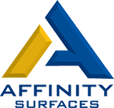Solid surface countertops have been available for over 25 years. They are a product of the plastics industry. Plastics, in one form or another, dominate the kitchen and bath countertop industry. The vast majority of plastic countertops are made from thin sheets of plastic laminated to wood or wood by-product substrates. Solid surface countertops are simply that, they are solid plastic.
The solid nature of these materials offers distinct advantages. Colors and patterns are solid throughout the material. These solid surface materials have many of the same properties of wood, which allows them to be shaped and molded into countless shapes and figures. Because the material is plastic, special adhesives allow separate pieces of the material to be welded to one another to make one solid piece. These adhesives actually cause the plastic molecules of one piece to interlock with the molecules of the other piece.
Solid surface countertops do have distinct differences. Different materials are made from different plastics. Some materials are primarily acrylic while others are a blend of acrylic and polyester plastics. Those solid surface materials which have a high content of acrylic plastic seem to have higher performance standards.
Your concerns about durability are, for the most part, groundless. These materials have excellent characteristics. They have great impact resistance. Virtually all of them are nonporous, so they are unaffected by food and liquid stains. These nonporous surfaces also inhibit the growth of bacteria, mold, and germs.
A unique property of these solid surface materials is their ability to be easily repaired. Scratches can be buffed out by hand. Cigarette burns can be sanded away. Severe damage to the surfaces can also be repaired in virtually all instances. To the best of my knowledge, no other countertop material can make similar claims.
Solid surface countertops do have a slight drawback. Excessive, concentrated heat can damage the surfaces. However, this problem is frequently overcome with the use of decorative trivets made from the scrap material from the sink and cooktop cutouts.
You do have other alternatives, however, no single one seems to have as many advantages as solid surface materials. Natural stone products, such as marble and granite, can be difficult to repair. Solid color laminate plastics offer fewer advantages, yet cost virtually the same as solid surface materials.
Artificial stone products, because of their composition, do not seem to perform as well as the plastics. Remember, as with many other things, you get what you pay for!
Article Source:Ask the Builder
Subscribe to:
Post Comments (Atom)

No comments:
Post a Comment